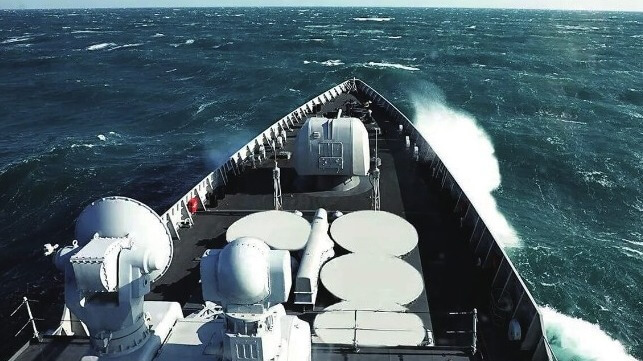China Launches Record Drills in Response to U.S. Support for Taiwan

Following the passage of the FY2023 National Defense Authorization Act, which enables substantial American support for Taiwan's defense, China launched a large-scale show of force in the Taiwan Strait - its largest demonstration since U.S. Speaker of the House Nancy Pelosi visited Taipei in August, and quite nearly the largest ever.
Over a 24-hour period from Sunday morning through Monday morning, China's military dispatched 71 aircraft and seven naval vessels to waters surrounding Taiwan. Nearly 50 of the planes crossed over the unofficial "median line" along the center of the Taiwan Strait.
The Global Times, an English-language tabloid belonging to the Chinese Communist Party's flagship paper, described the drills as "record-breaking" and linked them directly to U.S. support for Taiwan.
"The US' financing of weapons to Taiwan island is a serious provocation that has crossed the bottom line, and the PLA's drills were a response that showed its strong will and capability," retired PLA Air Force veteran and defense commentator Fu Qianshao told Global Times.
The FY2023 NDAA is a generous package, both for the U.S. military and for allied forces. It is $45 billion larger than the White House sought, packed with extra warships for the U.S. Navy, heavy duty aid for Ukraine and a $2 billion loan package for military assistance for Taiwan.
The $2 billion in loans under the Foreign Military Finance (FMF) program will allow Taiwan to buy more equipment from American defense manufacturers, subject to availability and approval from the U.S. Departments of State and Defense - approvals that have historically been slow to arrive.

that matters most
Get the latest maritime news delivered to your inbox daily.
The act also includes language that would require federal agencies to move swiftly on authorizing Taiwan's purchase requests, including the $14 billion in purchases that Taipei has already made and is still waiting to receive. That backlog includes $8 billion worth of F-16 fighter jets, $2.4 billion worth of Harpoon antiship missiles, $1 billion worth of SLAM-ER antiship missiles, and $0.6 billion worth of parts for a Patriot air-defense system - key ingredients for fending off a seaborne invasion.
Taiwan also got an upgrade in status that puts it higher in the queue for "excess defense materials" like outdated American ships and military vehicles. It did not, however, secure an upgrade in its diplomatic relations status, which the White House viewed as unnecessarily provocative.
